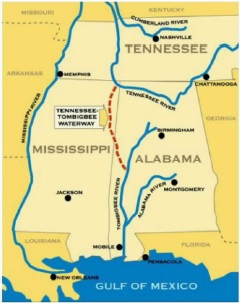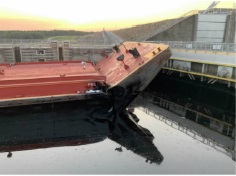Earlier this month, a Panel of the Eleventh Circuit considered two issues of first impression construing contribution and liability of a vessel owner under the Oil Pollution Act of 1990 ("OPA") 33 U.S.C. §§ 2701 – 2720. In Savage Services Corporation v. United States of America—F. 4th – (11th Cir. 2022), the Court held that OPA did not create a cause of action for contribution for the cost of oil removal by a vessel operator against the United States. Second, the Court determined that a vessel pushing a tank barge discharging oil into the navigable waters of the United States could not be shielded from all statutory liability for remedial costs by asserting that the federal government was solely negligent. Finally, the Panel held that the comprehensive liability scheme within OPA both displaced and preempted a vessel owner's claim against the United States arising under the Suits in Admiralty Act, 46 U.S.C. §§ 30901- 30918 ("SSA").
The 2019 Oil Spill on the Tennessee-Tombigbee Waterway
The fateful oil spill occurred on the Tennessee-Tombigbee Waterway (the "Tenn-Tom") which is a navigable manmade water network consisting of dams, locks, and canals connecting the Tennessee River in Mississippi with the Tombigbee River in Alabama. The Tenn-Tom is a 234 long waterway constructed by the U.S. Army Corps of Engineers ("Army Corps") and completed in 1984. Seventeen public ports and terminals are located along the Tenn-Tom. Ten locks were constructed within the Tenn-Tom Waterway. A photograph from the opinion is below.

In mid-September 2019, the M/V SAVAGE VOYAGER, owned by Plaintiff Savage Services Corp. ("Savage") pushed two tank barges down the Tenn-Tom. A tank barge is a vessel without propulsion designed to carry oil cargo or other liquid cargo. The M/V SAVAGE VOYAGER entered the Jamie Whitten Lock, which is a boat lift operated by the Army Corps. Savage asserted that once the barge was within the lock, the Army Corps prematurely lowered the water in the lock by 60 feet, bending and distorting the rake of the barge. A cargo tank was pierced, spilling crude oil into the navigable waterway. A photo of the barge from the decision is below.

Savage removed the crude oil from the Tenn-Tom at a cost of approximately $4 million. Savage then sued the United States in admiralty under the SSA seeking to recover its costs. Specifically, Savage contended that the Army Corps was negligent in its operation of the Jamie Whitten Lock. The United States District Court in Alabama (1) granted the Army Corps' partial motion to dismiss on the basis that the SSA did not provide for governmental waiver of sovereign immunity for spill removal costs, and (2) denied Plaintiff's motion for partial summary judgment. The District Court held that "Congress has expressed its intent to effect an implied repeal of the general sovereign immunity provision as it pertains to oil-spill cleanup damages." Savage appealed to the Eleventh Circuit.
The Eleventh Circuit Affirmed the District Court
The Eleventh Circuit in a carefully drafted opinion, considered the interplay between OPA and the SSA. The Court traced the legislative history of OPA and SSA, affirming the District Court decision on the issues discussed below.
A. OPA Does Not Create a Cause of Action Against the United States.
The Court examined the plain language of OPA, 33 U.S.C. § 2709 to determine whether the United States was within the definition of a liable person within the statute. Notably the Panel concluded that the definition of "person" in 33 U.S.C. § 2701 (27) did not include the United States Government. Accordingly, Savage did not have cause of action against the United States for removal costs.
B. OPA Did Not Provide Savage With a Complete Defense to Liability for Governmental Negligence.
The Panel concluded that OPA did not allow Savage to escape all liability for oil remediation and removal costs as a result of the spill. First, the Panel acknowledged that defenses to strict liability schemes like OPA "are exclusive and narrowly construed." The Court noted that 33 U.S.C. §2703(a) provides that a complete defense to payment of removal costs only if solely caused by (1) an act of God; (2) an act of war; or (3) an act or omission of a third party. Unlike the Federal Water Pollution Control Act, 33 U.S.C. §1321 which included an explicit defense for negligence of the federal government, OPA completely eliminated this absolute defense to strict liability under the OPA regime. Therefore, Savage could not evade liability by reliance upon §2703(a).
C. OPA Remedies are Exclusive.
The Panel first examined the principles of Hinck v. United States, 550 U.S. 501, 506 (2007) in which the Supreme Court held that "a precisely drawn, detailed statute pre-empts more detailed remedies." Id. The Court analyzed the decisions of other Circuit Courts that concluded that OPA is the exclusive remedy for all oil-removal claims within the penumbra of the statute. Finally, the Panel concluded that OPA provides a comprehensive scheme for allocating fault and liability for oil spills. Savage was not entitled to bring suit under the SSA against the government to recover removal costs.
Originally Published by ATLP
The content of this article is intended to provide a general guide to the subject matter. Specialist advice should be sought about your specific circumstances.

